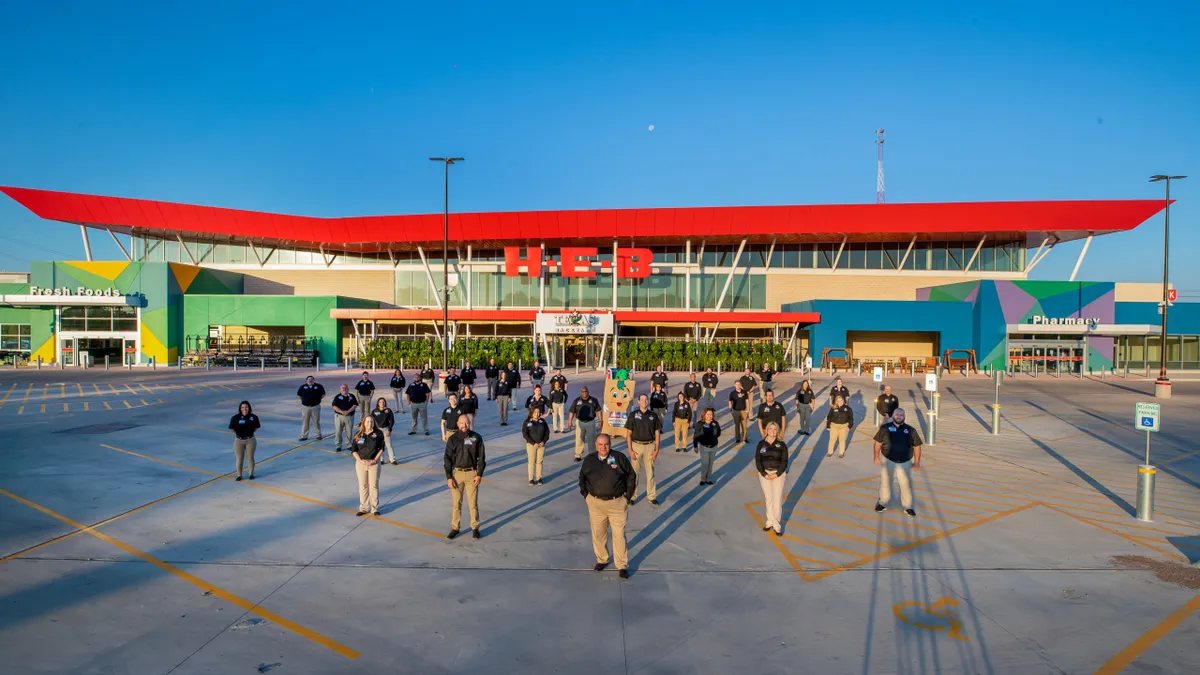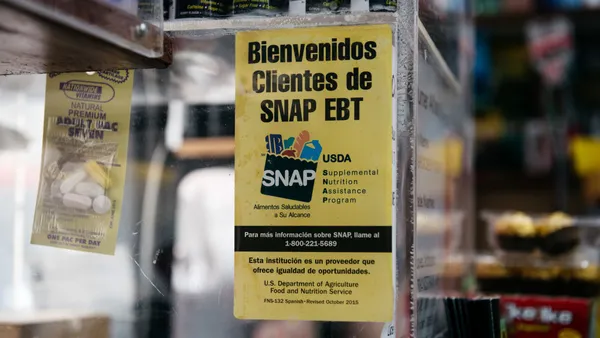By now, H-E-B’s preparation for the coronavirus outbreak has become the stuff of industry legend. The company’s emergency preparedness team began tracking the virus’s progress in January, reaching out to retailers and suppliers in China as well as Europe to figure out what was heading their way. The team simulated the impact of a pandemic on its roughly 400 stores in Texas and Mexico, marshaled extra supplies and established an emergency command center inside one of its warehouse facilities.
As a result of all these efforts, H-E-B maintained a steady hand amid the chaos that eventually struck Texas and the rest of the U.S. It rolled out initiatives like social distancing and traffic metering before other chains. Its stores experienced empty shelves just like other retailers, but it kept supplies strong in core categories like meat, produce and dairy, in no small part thanks to owning many of its own manufacturing plants and having strategically placed warehouses throughout the Lone Star State.
Pedro Reyes, an associate professor of supply chain management at Baylor University, said H-E-B’s “strategically located” distribution facilities helped it quickly supply stores and change tracks as needed. He said the company has one of the strongest emergency supply chains among retailers he’s studied.
“Nobody could have predicted the magnitude of this, but because they had policies in place on how to react to this stuff, they were able to adjust a lot quicker than other grocery stores,” Reyes said.
H-E-B got creative when it had to. It relied on a beer distributor to ship eggs to its stores, and partnered with a distributor that primarily supplies schools and restaurants to deliver deli meats and rotisserie chickens to its stores. Pamela Riemenschneider, the Austin-based retail editor for Blue Book Services, which provides credit ratings and business information for the produce industry, said her local H-E-B supplied "goofy" tropical-scented toilet paper when the usual supplies ran out.
In March, H-E-B established a dedicated delivery service for people aged 60 and older that became a lifeline for vulnerable customers. The program started at just over half the grocer’s locations and within three weeks was available at every H-E-B store. Favor, the e-commerce service H-E-B owns, doubled the markets it served statewide and launched an express delivery service.
As the magazine Texas Monthly put it in a much-shared story recounting the grocer’s efforts: “No store did more.”
But what H-E-B did after those frenzied spring months is notable as well. While other grocers were winding down their employee raises, it instituted permanent wage increases for its team members. In October, eight months after the pandemic began in earnest, it gave workers a $500 bonus.
H-E-B has also resumed opening stores and rolling out new concepts. In August, it opened Main Streat, its first in-store food hall featuring local restaurants, as well as in-house restaurant concepts at a store in Austin, Texas. The grocer has continued pushing into new markets like Lubbock while also building up density in core markets like San Antonio and Austin.
And when the central question for consumers shifted from, “Can I find all the products I need?” to “What’s for dinner?” H-E-B stepped up with compelling solutions, said Anne-Marie Roerink, principal and founder of 210 Analytics.
"The signage in the store actually referenced 'looking for something different than the same old, same old?' which is exactly what people complained about," she noted.
H-E-B partnered with local restaurants to serve special packaged meals. When its own in-store restaurants were forced to clos in-store dining, it turned to takeout service. H-E-B also ramped up its Meal Simple collection of ready meals and accompaniments, including grab-and-go, oven-ready and microwaveable options. Riemenschneider said Meal Simple has gone from a small refrigerated display to a full-blown department in stores near where she lives, offering salads, soups, international cuisine and even fresh breakfast items.
Riemenschneider also said H-E-B is offering more bulk-sized goods and has begun putting limits again on goods like toilet paper. But the shopping experience remains lively and upbeat. Stores still have bountiful produce displays and fresh meat counters, and the PA system plays a folksy reminder from a man with a thick Texas accent that says, “We’re all in this together.”
“They've done a really great job, and even early in the pandemic, of making you feel like you weren't pandemic shopping,” Riemenschneider said.
Roerink pointed to back-to-school displays that included small face masks and hand sanitizer along with virtual-learning tools as evidence of just how intricately H-E-B knows and studies its shoppers. "Whereas many grocers don’t even chase the back-to-school sales any more, H-E-B made it a strong destination that actually drives traffic to the store," she said.
Indeed, the 115-year-old grocer is well-known as a whip-smart operator and a customer favorite, having won just about every recognition and award under the sun. And yet it still managed to outperform expectations during one of the most challenging periods the grocery industry has ever experienced.
"Having followed H-E-B over the course of 20 years has shown only two constants: a tremendous sense of community and ever-present innovation," Roerink said.




 Read more
Read more








